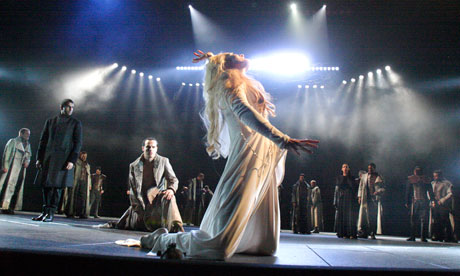Henrik Ibsen, in a new version by Ben Power
Directed by Jonathan Kent
★★★★
Directed by Jonathan Kent
★★★★
 |
| Courtesy of the National Theatre |
We were very pleased when we got our hands on our tickets for Emperor and Galilean, but perhaps not for the correct reasons. In truth, before seeing this show the excitement was due to the fact that it meant we needed only to see London Road (which we intend to do this weekend) in order to have witnessed every single production in the National’s current season. To be honest, I for one was unsure what to expect (not being a particularly avid follower of Ibsen’s work), but with a running time of over three hours, I was bracing myself for a long, wordy and potentially exhausting production. Upon leaving the Olivier auditorium however, it was clear that my preconceptions were misplaced, and that the National’s latest production could generate much excitement now that it has officially opened. The reason? It is, in brief, a totally gripping and awe-inspiring spectacle, which is hopefully bound for a sellout run.
Many will recognise the name of Henrik Ibsen, the Norwegian playwright from the end of the 19th Century who is responsible for such classics as Hedda Gabler and The Doll’s House. Most, however, will not have heard of Emperor and Galilean despite Ibsen himself regarding it as his most important work. Indeed before now, Emperor and Galilean has never been performed in English, perhaps due to the formidable challenge of translating and adapting Ibsen’s longest play, originally intended to be eleven hours long. This challenge has been taken up by Ben Power (Associate director of the National and dramaturg behind such works as Enron, A Disappearing Number and Earthquakes in London) and his creative team, who have produced this modern and sharp script which brings this 138-year-old play charging into the 21st Century, and which now constitutes the UK premiere of the cornerstone of Ibsen’s work.
The play centres around Emperor Julian the Apostate, his rise to power and his subsequent downfall, all set in the 4th Century AD. To synopsise the plot would be a long-winded process, not least because the action takes place over a period of twelve years. Suffice to say that it deals with the history of Christianity, and specifically the transition of the Roman Empire to Christendom. Freedom of religion, the nature of power and the role of religion in government are all important themes, and the analogies with today are made clear through Jonathan Kent’s staging, which melds elements and styles of both Antiquity and the modern Era in a stylistic manner. The result can only really be described as ‘epic’. A cast of over 50, ambitious, breathtaking set, lights and pyrotechnics, and let’s not forget the dual percussionists hammering away at an outrageous array of drums. It truly is a magnificent production and one of the most spectacular ever to hit the London stage.
However, dramatic technical effects are often used to cover inadequate acting or slow action. Crucially, this is not the case for Emperor and Galilean. The lead role of Julian is played by Andrew Scott (who was brilliant in Design for Living at The Old Vic last season), and he crafts a portrait of the Emperor-to-be which truly carries the whole show. The character he creates goes on an ostensible emotional voyage, from self-doubting student, to ambitious general, and culminating in a power-crazed megalomaniac. This is not an easy role to play, but Scott dominates the auditorium for all three hours of the show, rarely leaving the stage for longer than a minute. In short, Scott delivers an outstanding performance, perhaps one of the great performances in recent memory. Other standout performances come from theatre veteran Ian McDiarmid (Palpatine, The Emperor from the Star Wars films) as the mystic Maximus, and from Nabil Shaban, who is inspiring both onstage as Emperor Constantius and offstage as an advocate for disabled performers. Special mentions also go to James McArdle and John Heffernan in their supporting roles as Agathon and Peter respectively.
To conclude, Emperor and Galilean is a show which is well worth seeing, and probably quite unlike anything you will have seen before. It is an epic production in almost every respect: a gripping script, fantastic performances, and a triumphant audio-visual spectacle which I cannot even attempt to describe within the desired word limit. Sure, it had a few weaknesses, with some out-of-place projection and a few moments where the energy dropped, but the bottom line is this: here is a show with a running time of over three hours which manages to have you gripped, sitting on the edge of your seat for almost the entire duration. Don’t miss it.
Please feel free to leave your thoughts in the comments section below!
Emperor and Galilean runs at the National Theatre until 10th August 2011.
Box Office: 020 7452 3000 or book online at http://www.nationaltheatre.org.uk/64481/productions/emperor-and-galilean.html
 Everything Theatre Reviews, interviews and news for theatre lovers, London and beyond
Everything Theatre Reviews, interviews and news for theatre lovers, London and beyond


